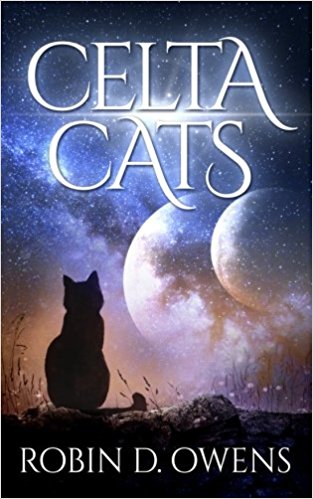 Celta Cats Formats available: paperback, ebook
Celta Cats Formats available: paperback, ebook Series: Celta's Heartmates
Pages: 144
on December 11th 2017
Purchasing Info: Author's Website, Amazon, Barnes & Noble, Kobo
Goodreads
Smart Cats know what they want. And on the world of Celta, they are very smart. They can be Familiar Animal companions, bonded with a person.
These stories are seen from the cat’s very own eyes, and are six never before published Cat Stories, including the first Top Cat of Celta, Peaches; as well as a trio of stories about that favorite Fam, Zanth.
Peaches Arrives on Celta, Plenty of problems for Peaches to fix: challenges to his status; people lying about Peaches’ human companion and Peaches himself; Grandma’s acting mean...and there’s that very real concern that the Ship just might not land safely, fear he must overcome…
Zanth Gets His Boy, Zanth’s meeting with a noble boy running from evil people changes both their lives in ways he couldn’t imagine
Pinky Becomes A Fam, Pinky is a smart enough cat to know that there is a difference from being a regular cat and a Familiar Companion Cat, and bonding better with his boy. He’s determined to make the leap from cat to Fam, but didn’t realize exactly what that meant…
Zanth Claims Treasure, Yes, the southern estate smells great, even better smelling is the glass orb full of magic that he finds, and will fight to keep…
Baccat Chooses His Person, Life on the streets in the winter isn’t what Baccat deserves, and he’s determined to find a good person to take care of him. After all, he has so much to offer…but does he really deserve what he gets?
Zanth Saves The Day, A FamCat on a beach just can’t sleep with all that odd hatching and squeaking going on. Zanth finds new friends and defends them against bullies…
My Review:
I’m still looking for comfort reading. When I heard the FamCats of Celta meowing my name, I decided to answer.
This is likely to be what a blogging friend refers to as a “short and sweet” review. This is not a big book, the stories do not have big messages, but they are a whole lot of fun, particularly if you like the Celta’s Heartmates series. The stories in Celta Cats illustrate bits of backstory or side story of events that are referred to in the main series, but are told from the point of view of the FamCats, the Familiar Companion animals of Celta who happen to be cats.
It seems that any animal can become a Fam, if they have enough Flair (psi power) and enough intelligence. Fams are intelligent at what we would think of as a human level, but do not think human thoughts. They understand human speech and thought, but as the stories illustrate, they do not change their essential nature. The FamCats, in particular, are always very cat. Particularly in the “dogs have owners, cats have staff” sense. FamCats expect rewards for their service, and are not remotely shy about demanding those rewards. It’s part of what makes them so much fun.
Although this collection features FamCats, in the main series we meet many other animals who have become Fams, including foxes, dogs, birds, and even housefluffs, which seem like a less predatory version of the dustbunnies in Jayne Castle’s Harmony series.
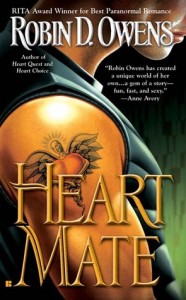
Several of the stories in this collection feature Xanth, the FamCat who owns and protects Rand T’Ash, the hero of the first book in the series, Heart Mate. From Xanth’s perspective, he is the dominant partner. Rand’s perspective may be otherwise. But one of the most interesting stories in the collection is the first meeting between Xanth and Rand, told from Xanth’s perspective. At that point, Rand was a scared and very young man, who had just watched evil men burn out his family home, killing his parents and siblings., while Xanth was a full-grown and battle-toughened street cat. Those same men are hunting Rand, and it is Xanth’s knowledge of Druida City’s back alleys that keeps them both alive until Rand matures enough to come into his full power and exact his revenge.
Escape Rating A-: For adult readers, Celta Cats is a book for fans. The joy in the stories is filling in missing pieces of Celtan history, and especially viewing that history through the eyes of the Fams, who are so often the best part, or at least the funniest part, of many of the stories.
As a short story collection, Celta Cats is being marketed as a children’s book. I have my doubts about that. It’s true that there is no “adult” content per se. These stories are not romances, while the regular books of the Celta’s Heartmates series most definitely are. But what makes these stories special is their connection to Celta. The Xanth stories are particularly fun because they connect to Xanth (and Rand) as we already know them. Whether young readers will find them interesting without knowing anything about the background of Celta is something I’m just not sure about.
But for those of us who love the series, and can’t wait until next year for our next visit to Celta, these stories are utterly charming.
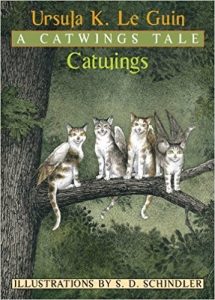 Reviewer’s Note: I read Celta Cats in the wake of Ursula K. LeGuin’s death. If you like the Celta Cats, you will love her Catwings series, which begins with, of course, Catwings. The Catwings stories, are, not surprisingly considering the title, about a family of winged cats. The wings seem to be a mutation, as the stories are set in the contemporary world and everyone, both cats and humans, are aware that the Catwings family needs to be protected from people who will want to study them. The stories are marvelous, the illustrations are lovely, and just like Celta Cats, the stories will be enjoyed by adults who love any intersection between cats and either science fiction or fantasy.
Reviewer’s Note: I read Celta Cats in the wake of Ursula K. LeGuin’s death. If you like the Celta Cats, you will love her Catwings series, which begins with, of course, Catwings. The Catwings stories, are, not surprisingly considering the title, about a family of winged cats. The wings seem to be a mutation, as the stories are set in the contemporary world and everyone, both cats and humans, are aware that the Catwings family needs to be protected from people who will want to study them. The stories are marvelous, the illustrations are lovely, and just like Celta Cats, the stories will be enjoyed by adults who love any intersection between cats and either science fiction or fantasy.

 Deborah Rising by
Deborah Rising by  Then again, when the story ends she’s only 14. She has time yet. And another whole book (
Then again, when the story ends she’s only 14. She has time yet. And another whole book (
 Her Sweetest Fortune by
Her Sweetest Fortune by 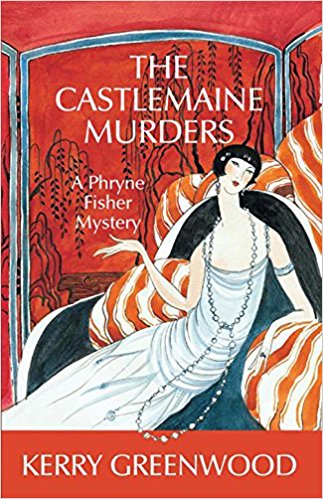 The Castlemaine Murders (Phryne Fisher, #13) by
The Castlemaine Murders (Phryne Fisher, #13) by 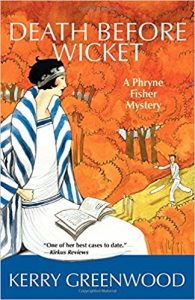 The Castlemaine Murders was one that tempted me a great deal. It had a lot of elements that made it just a bit different from previous books in the series, while, unlike
The Castlemaine Murders was one that tempted me a great deal. It had a lot of elements that made it just a bit different from previous books in the series, while, unlike  For those reading this book expecting it to be just like the TV show will probably be a bit disappointed, or even censorious about Phryne’s continued relationship with the married Lin Chung. But for those following the book series on its own merits, this one is a treat.
For those reading this book expecting it to be just like the TV show will probably be a bit disappointed, or even censorious about Phryne’s continued relationship with the married Lin Chung. But for those following the book series on its own merits, this one is a treat.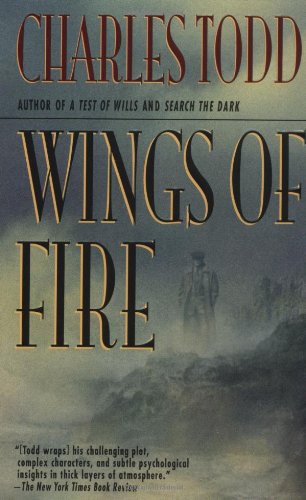 Wings of Fire (Inspector Ian Rutledge, #2) by
Wings of Fire (Inspector Ian Rutledge, #2) by 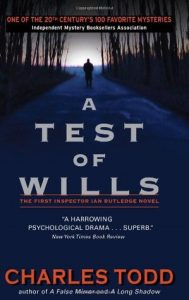 I’ve been looking for comfort reads this week, and that has led me to take a look at some mystery series that I’ve been meaning to get caught up on. Today, that led me to Wings of Fire, the second book in Charles Todd’s
I’ve been looking for comfort reads this week, and that has led me to take a look at some mystery series that I’ve been meaning to get caught up on. Today, that led me to Wings of Fire, the second book in Charles Todd’s 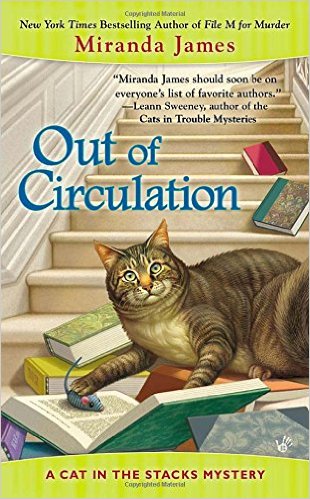 Out of Circulation (Cat in the Stacks, #4) by
Out of Circulation (Cat in the Stacks, #4) by 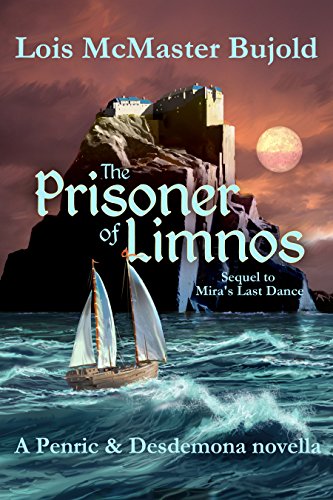 The Prisoner of Limnos (Penric & Desdemona #6) Formats available: ebook, audiobook
The Prisoner of Limnos (Penric & Desdemona #6) Formats available: ebook, audiobook 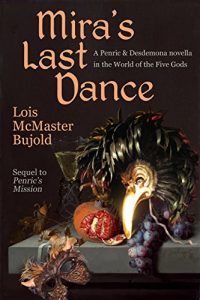 The Prisoner of Limnos picks up immediately after
The Prisoner of Limnos picks up immediately after 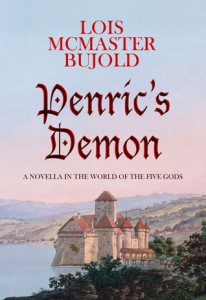 Escape Rating A-: This is a rescue where everything goes right, everything goes wrong, and a seagull goes ‘poof’.
Escape Rating A-: This is a rescue where everything goes right, everything goes wrong, and a seagull goes ‘poof’.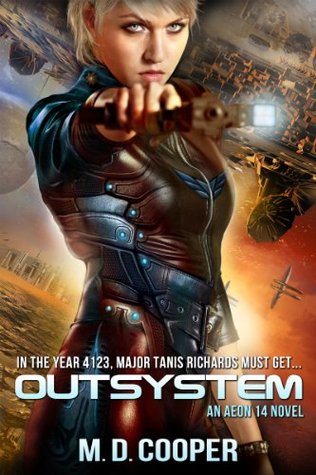 Outsystem (The Intrepid Saga #1) by
Outsystem (The Intrepid Saga #1) by 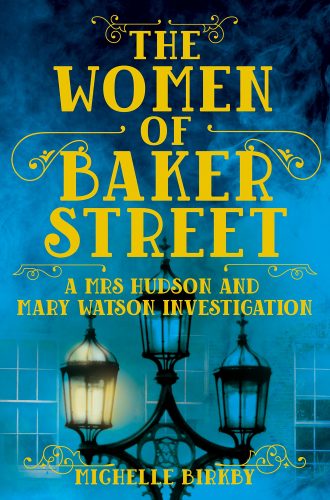 The Women of Baker Street (A Mrs Hudson and Mary Watson Investigation, #2) by
The Women of Baker Street (A Mrs Hudson and Mary Watson Investigation, #2) by 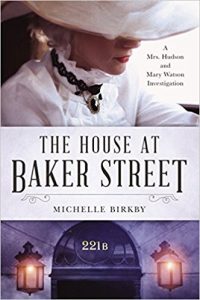 I read
I read 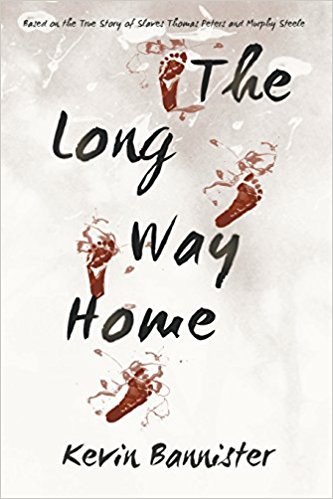 The Long Way Home by
The Long Way Home by